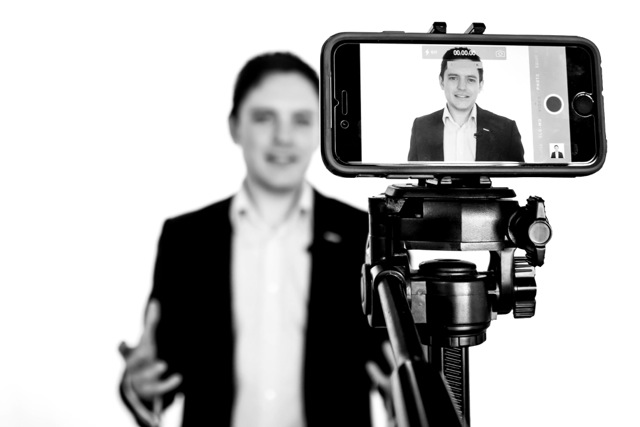I spent yesterday in the studio. That statement sounds very grand… the reality was somewhat more chaotic. The furniture in the office pushed against the walls, a white sheet erected for a back-drop, several lights cluttering the floor space and my iPhone 6 attached to a tripod to record the proceedings. Very soon you’ll be able to judge the results for yourselves as I start releasing the videos on YouTube but I’m amazed at what can be achieved using such a simple set up. In fact the resolution of the finished product will be significantly higher than the footage I have from an episode of Doctors I shot for the BBC 10 years ago. It’s amazing how far technology has come!
Being in front of the camera is something that feels quite natural for me now. It’s something I’ve been doing for a long time. But it wasn’t always that way. The first time I did it, I was absolutely petrified. I’d had the amazing good fortune to be cast in a big budget BBC period drama called The Lost Prince which was directed by the legendary Stephen Poliakoff. In the cast were some of Britain’s finest actors, Michael Gambon, Miranda Richardson, Tom Hollander, Bill Nighy and me… 20 years old, completely new to television and desperate not to make a fool of myself!
As I stepped up to shoot my first scene I was a nervous wreck. All the main cast were there along with about 200 extras! The pressure was huge. My lines kept flying out of my head and I just couldn’t remember what I was meant to say next. My hands were shaking and my voice felt tight. The camera was rolling and the director shouted “Action!”. A complete jumbled mess came streaming from my mouth. “Cut!” I heard Stephen cry and we reset to shoot again. I was mortified. The second take was no better. What was I going to do? It was Michael Gambon that broke the ice. All of a sudden he burst out laughing, stood up and started clapping!! He could see that I was struggling and came to my rescue offering words of reassurance. I instantly relaxed, smiled, took a deep breath and the third take was word perfect. That first TV job taught me so much about how to work on camera and I’ve been lucky enough to learn many valuable lessons throughout my career, so I thought I’d use this blog to quickly share my top 5 tips.
1. Don’t take yourself too seriously
This was my major take-away from that first challenging experience in front of the camera. The more I worried about what other people were thinking of me the worse I performed. It’s easy to become very self-conscious and serious when you’re looking down the lens. Try to stay playful and give yourself a break. The beauty of digital cameras is that you can do as many takes as you need to get the right footage, so don’t worry about getting it right first time.
2. It’s all in the eyes
The eyes are the windows to the soul and this is especially true on camera. The lens has an amazing ability to pick up on your emotion and we tend to see it in the eyes. Think happy thoughts and the eyes sparkle on screen. If you’re feeling sad or tired the eyes will seem dull and lifeless. Make sure that your mental state matches your objective when speaking on camera. If you want your audience to be excited and inspired by your message, you need to be completely energised. If you’re not, they’ll see it in your eyes.
3. Warm up your face
When we’re in a room talking to someone they can normally see our whole body. When we’re speaking on camera they normally only get to see our head. This mean’s all the extra information conveyed in our body language needs to be channeled into our facial expression. I’m not suggesting for a second that you start gurning or doing strange things with your lips to get your audience’s attention but you do need to make sure everything is alive and warmed up. There are a staggering 42 muscles in the face, so having a stretch, blowing through the lips and screwing everything up before you go on camera will make sure the lens really captures your emotion and gets your message across.
4. Treat the camera like a friend
It’s important to remember that when you look directly down the lens of a camera you are looking straight into the eyes of your audience. To make the connection between you and the viewer really strong, the best piece of advice I was ever given was to imagine that you are talking to a friend. If you treat the camera as if it is someone you like and trust, that will come across in what the audience sees. It’s a really simple technique to implement and it makes a massive difference to your performance.
5. Don’t be afraid to go off script
Obviously if you’re acting in a big budget feature film this tip isn’t really an option (unless the director gives you permission) but when we’re making videos in order to connect with and serve our audience sometimes a full script can make things too rigid. If you’re not experienced in the actor’s art of bringing word off the page, you can often come across as wooden or stilted. In my experience it’s much better to sketch out a few bullet points that you want to talk about and use the other 4 tips above to bring them to life. There’s something about an “off the cuff” video that gives you real credibility and builds trust with the audience. So, next time you’re tempted to write the whole things out, take a risk and shoot from the hip instead. I guarantee that the results will be more authentic and engaging.
I hope you found these tips useful and would love to hear any other things you do to come across like a pro on screen, so leave your comments in the box below or tweet me @dominiccolenso.
Good luck with your videos.
Keep shining!
Dominic







